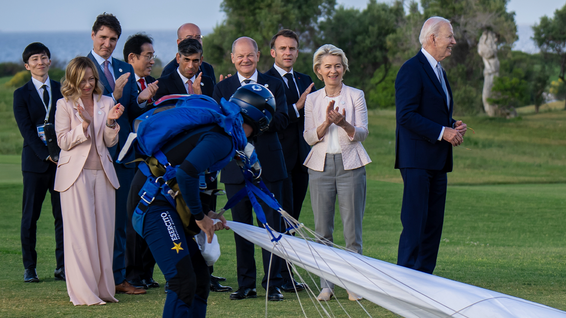Global Treaty Talks Approach Deadline as Negotiators Craft Text to End Plastic Pollution
- April 30, 2024 02:00pm
- 114
Negotiators from around the world are hard at work in Ottawa, Canada, drafting the text of what is set to become the first-ever global treaty to end plastic pollution. The delegates are working to turn their ideas into concrete language as they approach the end of the five-scheduled summits.

As negotiators from around the world gather in Ottawa, Canada, for the fourth of five scheduled summits on plastic pollution, the discussions have shifted from ideas to treaty language. The delegates are tasked with drafting the text of a global treaty to end plastic pollution, which is a daunting task given the complexity of the issue and the differing perspectives of the countries involved.

One of the most contentious issues is the idea of limiting how much plastic is manufactured globally. This proposal has met with strong objections from plastic-producing countries, companies, and oil and gas exporters, as most plastic is made from fossil fuels and chemicals.
Despite the challenges, the negotiators share a common vision of moving forward in the treaty process. Ecuador's chief negotiator, Walter Schuldt, emphasizes the importance of the treaty, saying, "Because at the end of the day, we're talking about the survival of the future of life, not only of human life but all sorts of life on this planet."
The delegates have been discussing not only the scope of the treaty but also chemicals of concern, problematic and avoidable plastics, product design, and financing and implementation. They have also streamlined the unwieldy collection of options that emerged from the last meeting.
Scientists from the Scientists' Coalition for an Effective Plastics Treaty have come to the meeting to provide scientific evidence on plastic pollution to negotiators. They aim to dispel misinformation and ensure that the treaty is based on sound science.
Indigenous Peoples' Caucus members have also voiced their concerns, emphasizing that microplastics are contaminating their food supply and threatening their communities and ways of life. They feel that their voices are not being heard and are calling for greater representation in the decision-making process.
The treaty talks began in Uruguay in December 2022, and progress has been slow at times. However, the delegates are committed to working between meetings to ensure that a treaty is concluded by the end of 2024.
The treaty will likely catalyze and guide actions and international cooperation needed to create a future free of plastic pollution. The world is counting on the negotiators in Ottawa to deliver a treaty that will make a meaningful difference in the fight against plastic pollution.
In particular, the treaty is expected to address the following areas:
* Limiting plastic production
* Promoting recycling and reuse
* Reducing the use of single-use plastics
* Investing in sustainable alternatives
* Cleaning up plastic pollution
The treaty is expected to be legally binding and will require countries to take specific actions to reduce plastic pollution. It is also expected to provide financial and technical assistance to developing countries to help them implement the treaty.
The treaty is a significant step forward in the fight against plastic pollution. It is a testament to the growing global recognition of the need to address this issue. The treaty is expected to have a major impact on the way plastic is produced, used, and disposed of around the world.
Related articles
-
 International Leaders Urge Biden to Step Down Amid Cognitive Concerns
President Biden is facing growing pressure from the international community to withdraw from the 2024 presidential race due to concerns about his...
International Leaders Urge Biden to Step Down Amid Cognitive Concerns
President Biden is facing growing pressure from the international community to withdraw from the 2024 presidential race due to concerns about his...
- 06 Jul 2024
-
 Biden Campaign Launches Blitz Amidst Growing Pressure
Despite facing mounting pressure to drop out of the presidential race, the Biden campaign has launched a $50 million paid media blitz to boost his...
Biden Campaign Launches Blitz Amidst Growing Pressure
Despite facing mounting pressure to drop out of the presidential race, the Biden campaign has launched a $50 million paid media blitz to boost his...
- 06 Jul 2024
-
 Conservative Sunak Apologizes for Ditching D-Day Ceremony for TV Interview
British Prime Minister Rishi Sunak has apologized for leaving D-Day commemorations early to do a TV interview, sparking widespread backlash. Sunak,...
Conservative Sunak Apologizes for Ditching D-Day Ceremony for TV Interview
British Prime Minister Rishi Sunak has apologized for leaving D-Day commemorations early to do a TV interview, sparking widespread backlash. Sunak,...
- 06 Jul 2024
-
 Ukraine's Black Sea Reversal: Russian Warships Forced to Rebase Amidst Heavy Blows
Vice-Admiral Oleksiy Neizhpapa, Ukraine's navy chief, reveals Russian warships have been extensively damaged and forced to relocate, as Ukraine...
Ukraine's Black Sea Reversal: Russian Warships Forced to Rebase Amidst Heavy Blows
Vice-Admiral Oleksiy Neizhpapa, Ukraine's navy chief, reveals Russian warships have been extensively damaged and forced to relocate, as Ukraine...
- 06 Jul 2024
-
 Trump vs. Biden: A No-Holds-Barred Debate Challenge
Former President Donald Trump has called for a second debate with President Joe Biden, this time without moderators. Trump claims that Biden needs to...
Trump vs. Biden: A No-Holds-Barred Debate Challenge
Former President Donald Trump has called for a second debate with President Joe Biden, this time without moderators. Trump claims that Biden needs to...
- 06 Jul 2024
-
 Iranians Head to Polls in Presidential Runoff Amidst Discontent and Turmoil
With Supreme Leader Ali Khamenei holding ultimate power, the election could steer the country toward confrontation or collaboration with the...
Iranians Head to Polls in Presidential Runoff Amidst Discontent and Turmoil
With Supreme Leader Ali Khamenei holding ultimate power, the election could steer the country toward confrontation or collaboration with the...
- 06 Jul 2024

Leave a comment
Your comment is awaiting moderation. We save your draft here
0 Comments
Chưa có bình luận nào